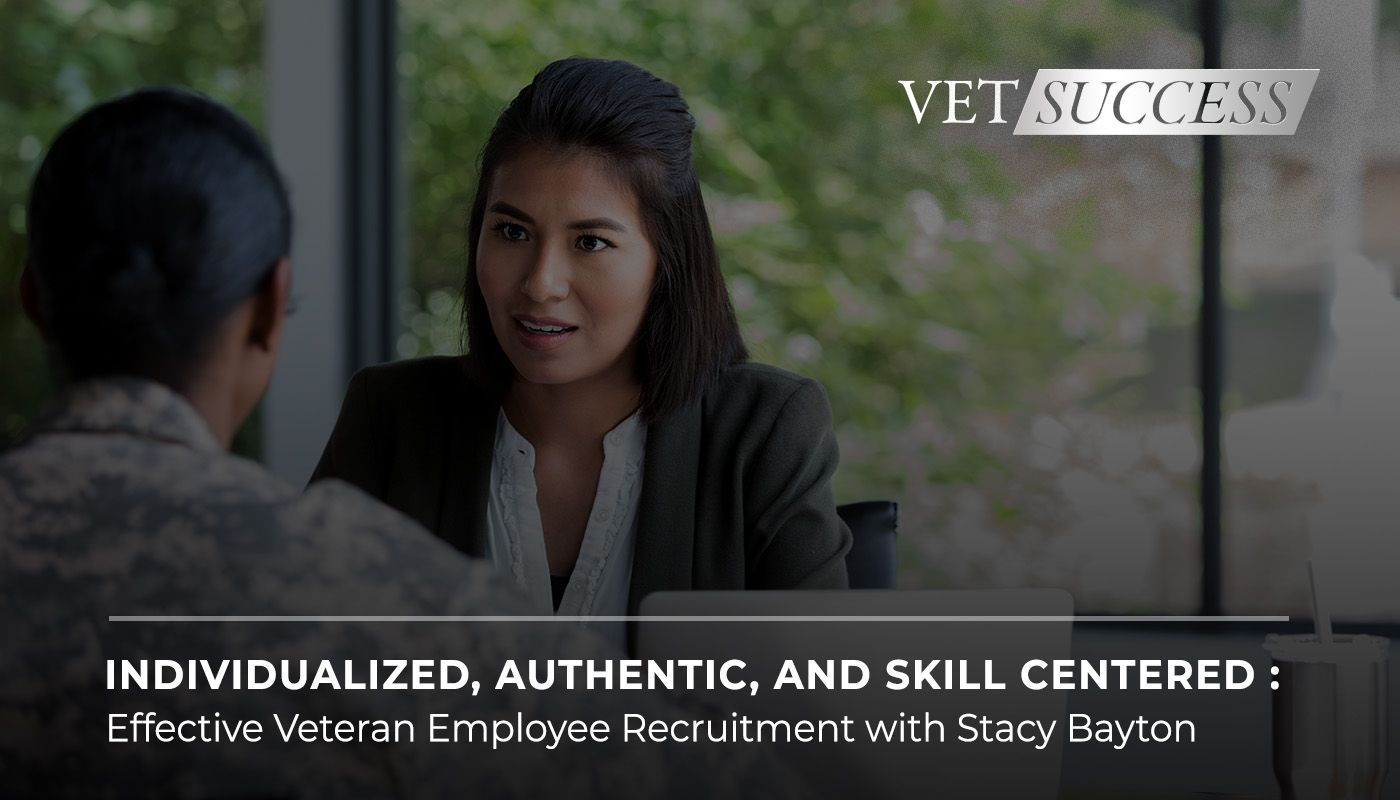
Employers have made a concerted effort to attract military veteran talent. With 61% of employers prioritizing veteran hiring in the next five years, there is definite demand for military veterans in the civilian workforce. This demand is highly understandable, as military veteran employees typically have attributes that contribute to companies’ bottom lines, like being dedicated to teamwork, having a strong work ethic, performing well under pressure, and having acute problem-solving skills.
Despite the enthusiasm for hiring military veterans, 53% of employers reported needing resources and guidance for veteran recruitment. While there is no one-size-fits all solution for ensuring veterans’ successful transition into a civilian career, American Veterans Group sat down with Stacy Bayton – Senior Executive at VetJobs, Corporate America Supports You – Military Spouse Corporate Career Network (CASY-MSCCN) and Marine Corp veteran, to discuss how employers can improve their military veteran employment efforts.
VetJobs is the leading online resource for military-affiliated job seekers looking to attain a rewarding career and maximize their earnings. Over the past two decades, VetJobs has placed over 91,000 Veterans, Transitioning Military Members, National Guard and Reserves, and Military Spouses, into industry leading and high-earning careers. Through its partnership with VetJobs, American Veterans Group has helped 68 veterans transition into rewarding civilian careers.
Look at veteran job seekers as individuals.
Companies have been eager to hire veterans and military spouses, but would center these efforts, disproportionately, on entry-level positions or positions in very specific industries. While the intent was good, it often led to veterans’ underemployment, and job dissatisfaction.
However, as Stacy Bayton shared, there has been a real shift in recent years, where companies are making a more concerted effort to find the best fit for their prospective military veteran employees.
“One of the biggest evolutions has been that companies aren’t really trying to fit military into an entry level box anymore. Instead, they’re looking at them as individuals.”
Yes, companies need to have employee recruitment and retention programming that is responsive to veteran job seekers’ common challenges and perspectives – but they need to evaluate all candidates as individuals, with unique skills, interests, and personalities. Veterans reflect the diversity of America, and companies need to match veterans with positions that are the right fit.
Evaluate your company’s employee branding and how it speaks to military veteran job seekers.
Military veterans, like all job seekers, use a variety of methods when they are looking for their next opportunity. An Indeed survey of military veteran job seekers reported:
· 62% use online job sites/boards
· 58% visit job sites in person
· 39% attend job fairs
· 37% leverage their personal network
· 34% use online social network
· 33% connect through recruitment staff
· 31% use their local newspaper
· 29% use temp agency specializing in Military experience job seekers
Veterans will often look to see how “veteran-friendly” an employer is by searching for explicit veteran hiring programs and initiatives, whether the company has veteran representation in leadership and HR, and reading reviews from current and past employees on their experience within the company.
For companies to align their employee branding with their veteran recruitment efforts, they should:
· Explicitly call out and highlight veteran-centered programming, initiatives, and leadership.
· Ensure job descriptions and titles use military-friendly keywords, and skill translations
· Train and educate hiring managers and recruiters on best practices for hiring military veterans.
· Allocate the appropriate recruiting marketing resources based on the company’s prioritization of veteran job seekers.
Bayton stressed how critical open and consistent communication is in the veteran recruitment process, which is central to companies crafting their employee branding strategy and practices.
“Be honest… We really encourage open communication and understanding on all sides.”
Center skill translation and matching in all military veteran recruiting.
Companies and veteran job seekers alike have struggled to translate military experience and expertise to the skills required of different civilian jobs. Employers need to invest in training hiring managers and recruiters on how to translate veterans’ skills so job seekers are placed in positions that best fit and utilize their talents and experience.
Bayton emphasized the importance of this skill translation and warned against companies simply directing veterans to their job boards.
“We actually want to pre-qualify our people, identify gaps, make sure they’re qualified… We want them to land in the right company and understand their role so they can grow. Then the retention is there. The company is happier, the person is happier. We just do a much better job on both sides when we put a little bit of work into it.”
Companies’ military veteran recruiting efforts should reflect the genuine values and needs of each organization. Just as with the non-veteran talent pool, veteran job seekers reflect a wide array of skills and interests that would positively impact organizations at all levels. The key is to take the time and effort to find the right fit.
Join the conversation on military veteran recruitment and retention at VetSuccess 2023.


